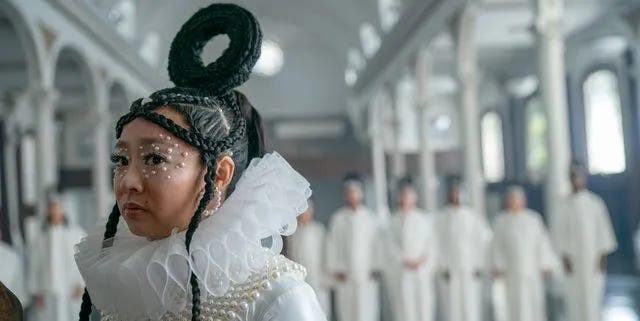Brené Brown says, “When I look at narcissism through the vulnerability lens, I see the shame-based fear of being ordinary. I see the fear of never feeling extraordinary enough to be noticed, to be lovable, to belong, or to cultivate a sense of purpose.”
One of the dominant themes in Everything Everywhere All At Once (EEAAO) is purpose and meaning. In the story, Michelle Yeoh’s Evelyn, is living what many of us might call an ordinary life. She lives above the laundry mat she owns and runs with her husband Waymond, played by Ke Huy Quan. She is distant from her daughter, Joy and is caring for her aging and wheelchair-bound father.
Her life should’ve turned out differently.
Over her father’s objections she abandons her family of origin and her dreams of becoming an artist in order to move to America and marry Waymond. Waymond, turns out, is a kind, but passive man. Trapped between family and financial commitments, Evelyn is at an age where many people ceasing dreaming and accept whatever life has delivered.
Enter, next, the multiverse.
Evelyn, turns out, is not the only Evelyn. There are versions of her across the multiverse, one with hot dog fingers (gross!) and others living her dreams of becoming a singer or movie star. She has other lives, too. There are other places where she is center stage, celebrated; universes where she made different choices and those choices — in some senses — paid off.
There are other universes where she is not ordinary.
Being Ordinary
Isn’t it being ordinary that many of us fear, as Brené Brown says? How deeply do we feel that our lives should be special and noticed? Isn’t being noticed part of what we celebrate when we herald others for “seeing us” or “hearing us”? The human condition is such that in a world of 7.8 billion people, we want to be unique.
And the truth is, we are not.
Every once in a while, I will tell my church, “you are not unique.” In those moments, I feel the strictures and tensions well up inside my hearers. The arguments and rejections of that statement cannot be hidden in their faces. After a lifetime of being told “Honey, you are unique,” and using that deeply embedded psychological device to maneuver through difficulty, we have all been indoctrinated to the false reality that we really are unique. But we are not. I’m not. You’re not.
Not being unique (which means one-of-a-kind), does not mean, however, that we are not special.
If, for our lives to have meaning, we have to be unique, like Evelyn, we will wake up one day with all our hopes dissolved into a bowl of something melted. We will hate something or someone for our lives not having been what we imagined it should’ve been. We will hope that we can universe jump to another world more receptive to our imaginations.
Embracing Ordinary
Instead, what we need to embrace is the reality that ordinary is exactly what we are supposed to be. I hesitate to say this, but I receive a good deal of praise for my preaching and teaching. Every now and then someone will ask, “How do you do it?” They often find my answer stunning: “I assume most people’s lives are much like mine.”
In short, I’m ordinary. And everyone else is ordinary too. We have similar hopes, fears, temptations, dreams, trepidations, and struggles. And it is in that ordinariness that we meet one another.
What’s more, it’s in the ordinariness that God transforms us.
Dallas Willard wrote, “The obviously well kept secret of the ‘ordinary’ is that it is made to be a receptacle of the divine, a place where the life of God flows.”
The Jewish and Christian scriptures are an epic tale of God seeking, using, and redeeming ordinary people who were minding their own ordinary lives when God ask something remarkable of them. In their plain vanilla days, God sees them, leads them, and loves them.
God never visits a king and tells them God will make them great. God never approaches a celebrity.
If you want God, you will find God in the ordinary. That means, if you are ordinary, God can be found in you.





